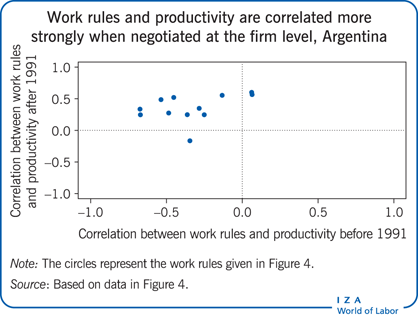Elevator pitch
Because theoretical arguments differ on the economic impact of collective bargaining agreements in developing countries, empirical studies are needed to provide greater clarity. Recent empirical studies for some Latin American countries have examined whether industry- or firm-level collective bargaining is more advantageous for productivity growth. Although differences in labor market institutions and in coverage of collective bargaining agreements limit the generalizability of the findings, studies suggest that work rules may raise productivity when negotiated at the firm level but may sometimes lower productivity when negotiated at the industry level.

Key findings
Pros
Latin American countries that have reformed their labor institutions offer a unique opportunity to understand how changes in collective bargaining affect economic output.
The coverage and level of negotiations of collective bargaining agreements are important determinants of the association between negotiated work practices and labor productivity.
Firm-level negotiations, in general, promote productivity increases in developing countries.
In some developing countries, collective bargaining has remained fairly stable over time, with some tendency toward decentralization.
Cons
Labor market institutions, economic conditions, and collective bargaining coverage and negotiation levels vary across developing countries, making generalization difficult.
Industry-level bargaining may lower productivity by restricting managerial flexibility in response to market changes.
Weak representation of employers in collective bargaining may affect the coverage and outcome of collective bargaining.
Empirical evidence is more extensive on the effect of collective bargaining on wages than on productivity.